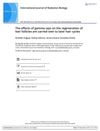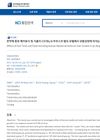Effects of EGCG on Hair Growth of C57BL6 Mouse Alopecia Model
January 2010
in “
Chinese Journal of Aesthetic Medicine
”
TLDR EGCG promotes hair growth in mice.
The study investigated the effects of EGCG on hair growth in a C57BL6 mouse alopecia model. Mice were treated with 8% EGCG, 5% minoxidil, or alcohol for 21 days after inducing hair cycle changes through depilation. Results showed that EGCG-treated mice exhibited earlier skin color changes and delayed transition to the next hair cycle phase compared to controls. Additionally, EGCG significantly increased the number of hair follicles, indicating that EGCG could induce and prolong the anagen phase and delay the catagen phase, thereby promoting hair growth in mice.





